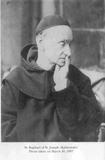19th NOVEMBER St. Raphael Kalinowski.
Raphael Kalinowski was born to Polish parents in the city of Vilnius in 1835. After military service, he was in 1868 condemned to 10 years of forced labour in Siberia. In 1977 he joined the Discalced Carmelite Order and in 1882 was ordained a Priest. He brought about the restoration of the Order in Poland and guided its growth. His life was distinguished for his zeal for Church unity and by his unflagging devotion to his ministry as a confessor and spiritual director. He died in Wadowice in 1907.
29th November Bl. Denis and Redemptus, Martyrs.
Denis of the Nativity, priest, whose secular name was Pierre Berthelot was born at Honfleur (France) in 1600. He was cartographer and naval commander in the service of the Portuguese crowns, but in 1635 became a discalced Carmelite in Goa. It was also at Goa that Thomas Rodriguez da Cunha, born in Portugal in 1598, had been professed as a lay Brother under the name of Redemptus of the Cross in 1615. They were sent together to Sumathra, where they were martyred on November 29th 1638 at Achen.
Saint Maria Maravillas of Jesus. December 11th.
Maravillas was born at Madrid in 1891. She entered the El Escorial Carmel, Madrid on 12th October 1919. In 1924 she founded a carmel at Cerro de los Angeles, alongside the monument to the sacred Heart of Jesus. From this foundation followed 9 others in Spain and one in India - Kottayam. She always gave first place to prayer and self sacrifice. She had a true, passionate zeal for the glory of God and the salvation of souls. Even while living a life of poverty in the cloister, she helped those who were in need, initiating apostolic, social and charitable works. In a particular way she helped those of her own order, Priests and other religious congregations. She died in the monastery of La Aldehuela, Madrid, on 11th December 1974.
ST. JOHN OF THE CROSS. DECEMBER 14th.
John the Yepes was born in 1542, at Fontiveros (Spain) and entered the Carmelite Order in 1563. In 1568 he became, at St. Teresa's suggestion, one of the first 2 friars of the discalced Reform, taking the name of JOHN OF THE CROSS. He was an heroic defender of the reform for the rest of his life. He died at Ubeda in 1591, and from that time he has enjoyed great esteem for sanctity and for the spiritual wisdom to which his writings testify.
BLESSED MARY OF THE ANGELS DECEMBER 16th
She was born in Turin (Italy) in 1661, and died after spending her whole life there, in 1717. In 1675 she entered the Discalced Carmelite Convent of St. Christina, and several times filled the offices of Prioress and Novice mistress. She underwent continual spiritual trials, but was constant nevertheless in her ardent love of God. She was outstandingly faithful to prayer and particularly devoted to St. Joseph, in whose honour a convent was foundedthrough her good offices at Moncalieri.
SAINT KURIAKOSE ELIAS CHAVARA. 3rd. JANUARY
Cyriac Kuriakose Elias Chavara, co-founder and first Prior general of the congregation of the carmelites of Mary Immaculate, was born at Kainakary in Kerala, India, on February 10th 1805. He entered the seminary in 1818 and was ordained a priest in 1829. He made his religious profession in 1855 and was vicar general of the Syro Malabar Church from 1861. He was also the co-founder of the Sisters of the Congregation of the Mother of Carmel in 1866. He defended the ecclesial unity against the schism of Rochos, worked all his life for the spiritual renovation of the church in Malabar. Above all he was a man of prayer, zealous for the Eucharistic Lord and specially devoted to the Bl. Virgin Mary Immaculate. He died at Koonammavu in 1871. His mortal remains were transferred to Mannanam in 1889.
St. Alphonsa an Indian Saint - who was beatified together with Kuriakose Chavara in 1986 - was miraculously cured from a serious illness in 1936 through the intercession of the latter. (She was canonized in 2008.)
Yet another Indian saint, Rosa Eluvathingal, was canonized along with Kuriakose Elias Chavara on 23.11.2014.
ST. PETER THOMAS. 8TH JANUARY.
Born about 1305 in southern Perigord, France, Peter Thomas entered the Carmelite Order at the age of twenty. He was elected Procurator General of the Order to the Papal court at Avignon in 1345. In 1354 he was made Bishop of Patti and Lipari, and thereafter often acted as Papal Legate in the cause of peace and of union with the eastern Churches. He was translated to Corone in the Peleponnesus, and made Papal Legate for the East in 1359; In 1363 he was made Archbishop of Crete; and in 1364 he became Latin Patriarch of Constantinople. In these Offices he distinguished himself as an apostle of Christian unity. He died at Famagosta in Cyprus in 1366.
SAINT ANDREW CORSINI. 9th JANUARY.
Andrew Corsini was born at the beginning of the fourteenth century in Florence, Italy, where he later became a Carmelite. He was elected Provincial of Tuscany at the General Chapter of Metz. On October 13th 1349 he became Bishop of Fiesole, and in governing his diocese he showed outstanding charity, apostolic zeal and prudence, together with great love for the poor. He died on January 6th 1374.
BLESSED MARY OF THE INCARNATION. 18th APRIL.
Barbe Avrillot was born in Paris in 1566. At the age of sixteen she married Pierre Acarie, by whom she had seven children. In spite of her household duties and many hardships, she attained the heights of mystical life. Under the influence of St. Teresa's writings, and after mystical contacts with the Saint herself, she spared no effort in introducing the Discalced nuns into France. After her husband's death, she asked to be admitted among them as a lay sister, taking the name of Mary of the Incarnation. She was professed at the Carmel of Amiens in 1615. She was esteemed by some of the greatest men of her time, including St. Francis de Sales. She was distinguished by her spirit of prayer and her zeal for the propagation of the Catholic faith. She died at Pontoise on 18th April 1618.
SAINT SIMON STOCK 16TH MAY.
Simon an Englishman, died at Bordeaux in mid-thirteenth century. He has been venerated in the Carmelite Order for his personal holiness and his devotion to Our Lady. A liturgical celebration in his honour was observed locally in the fifteenth century and later extended to the whole Order.
SAINT JOACHINA DE VERDUNA. 22nd. MAY.
Joachina was born in Barcelona in 1783. In 1799 she married Theodor de Mas, by whom she had nine children. Her husband died in 1816. In 1826 she was moved by the Holy Spirit to found the congregation of the Carmelite Sisters of Charity which spread throughout Catalonia, maintaining many houses for the care of the sick and the education of children, especially the poor. She loved to contemplate the mystery of the Holy Trinity, and this devotion characterized her life life of prayer, mortification, detachment, humility and charity. She died at Vich in 1854.
SAINT MARY MAGDALEN DE' PAZZI. 25th MAY.
She was born in Florence in the year 1566. After a pious upbringing she entered the Carmelite Convent where she led a hidden life of prayer and self denial. She prayed especially for the reform of the church. She was endowed by God with many spiritual gifts and directed her fellow sisters along the road of perfection.She die in the year 1607.
BLESSED ANNE OF ST. BARTHOLOMEW. 7th JUNE.
Ana Garcia was born at Almendral, Castille, in 1549. In 1572 she made her profession as a Carmelite in the hands of St. Teresa at St. Joseph's Avila. The Saint later chose her as her companion and nurse, and she subsequently brought the Teresian spirit to France and Belgium, where she proved herself, like Teresa, daughter of the church, in her great zeal for the salvation of souls. She died at Antwerp in 1626.

























